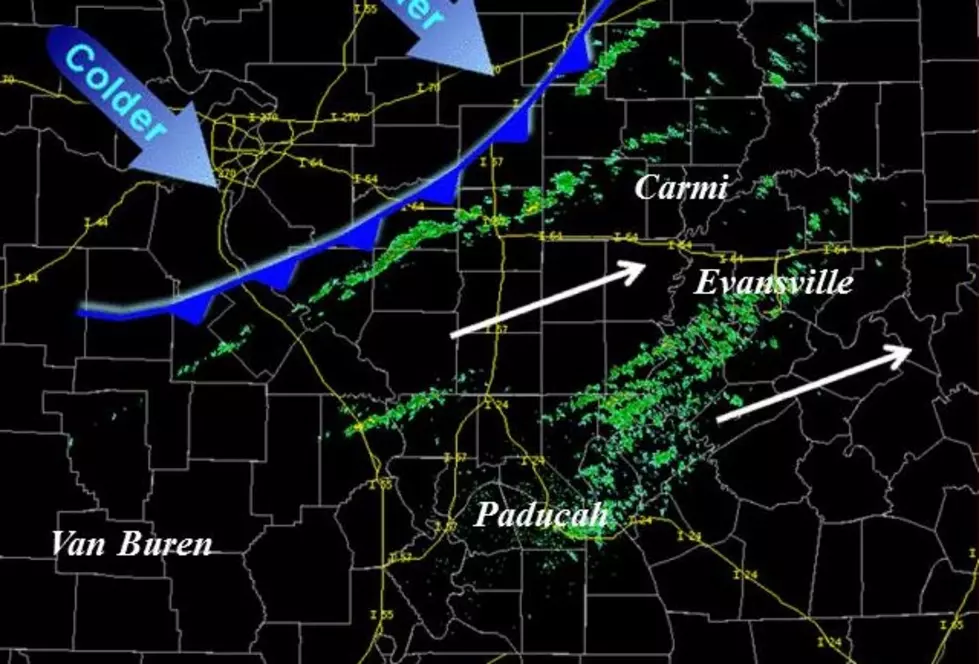
Chances of Freezing Rain and Ice Forecast Through the Weekend
Forecasts are predicting a variety of weather conditions across the state through this weekend, including the possibility of freezing rain and ice. Ice accumulation could be as much as a tenth of an inch in some areas, creating hazardous driving conditions.
A few degrees can mean the difference between rain or snow, so freezing rain and ice can be difficult for forecasters to pinpoint far in advance.
Yellow Salt Trucks Ready
The Indiana Department of Transportation will continue monitoring multiple weather forecasts and readying yellow salt trucks to treat interstates, U.S. highways and state routes.
If a storm is predicted lead off with frost or other freezing weather, INDOT sprays a saltwater brine as pre-treatment. If a storm is predicted to lead off with rain, salt trucks will treat the roads just before pavement temperatures fall below freezing and the snow and ice begin to accumulate.
Using granulated salt allows for traction, while also grinding the salt into the road so that it can melt the ice. Each route takes 2-3 hours to complete with salt assisting in melting between passes.
Know Before You Go
The state of Indiana and National Weather Service provide drivers with a number of tools to make safe, informed travel decisions. Check daily, hourly and graphical weather forecasts by zooming in and clicking on destinations at http://digital.weather.gov.
Before deciding to drive, check road and traffic conditions at http://indot.carsprogram.org, 800-261-ROAD (7623) or by turning on the traffic feature on a mobile mapping app. County governments post color-coded travel advisories on the Homeland Security website at http://in.gov/dhs/traveladvisory. For regular updates, find links to INDOT’s Facebook and Twitter pages at http://bit.ly/INDOTsocial.
Driver Tips
Freezing rain and ice are the most dangerous of all winter road conditions because it affects all vehicle sizes and types, including those with four-wheel drive and INDOT's own salt trucks. In these types of conditions, motorists are strongly encouraged to stay off the roads to allow access for salt trucks and emergency vehicles.
Here are several steps that drivers can take to minimize the risk of losing control on icy roads:
Consult hourly weather forecasts and schedule high-speed and long-distance trips during the warmer hours of the day. This will help save the extra time needed to slow down and drive according to the conditions.
Monitor current air temperatures and slow down if conditions are near or below freezing. Watch how salt trucks, emergency vehicles and other drivers are responding to the weather.
Apply anti-lock brakes firmly when encountering ice. Pump brakes that are not anti-lock. Do not overcorrect with steering.
Flooding Concerns
This system coupled with rainy conditions throughout this week may also create flooding issues statewide. If you encounter a road that’s flooded, turn around and find an alternate route. Never drive through as floodwaters can hide a washed out roadway or cause your vehicle to float and be carried into deeper waters.
Increased Likelihood of Potholes
After winter temperatures rise above freezing, motorists are more likely to encounter potholes on the roadways. Potholes form when water seeps into cracks on the roadway, freezes and then thaws. This process, combined with normal highway traffic, loosens the pavement creating potholes.
INDOT makes pothole patching a priority between snow and ice events. During the winter months asphalt plants are closed so a cold mixture is used to temporarily patch holes until a permanent patch can be made in the warmer months. Even after being filled with cold patch, the same pothole requires ongoing maintenance and can reopen several times throughout the winter
To report a pothole on a numbered state route, interstate or U.S. highway, contact your regional INDOT district or follow the “Report a Concern” link at http://potholes.indot.in.gov. For potholes on city streets or county roads, please contact the proper city or county maintenance department.
-Indiana Department of Transportation
More From WGBFAM








